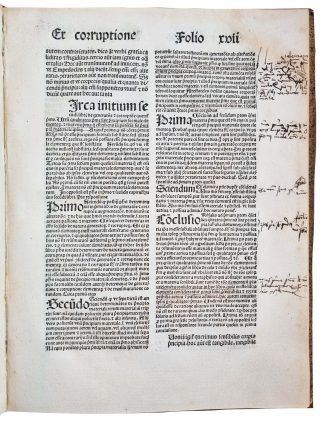VERSOR, Johannes.
INCUNABULAR PHILOSOPHY AND NATURAL SCIENCE
Quaestiones super libros de generatione et corruptione cum textu Aristotelis.
Cologne, Heinrich Quentell, 1493.£4,950.00
Small folio. 2 parts in 1, ff. [1], 63, [2], last blank, Aa-Ll6. Gothic letter, double column. First and last couple of ll. just toned and a trifle foxed at margins, very light water stain to upper outer corner, mainly to first half, long clean tear towards upper outer corner of Dd1. A very good, clean, wide-margined copy in C19 paper boards, gilt-lettered label, contemporary ms marginalia in a Germanic hand to one leaf.
A very good, clean copy of this scarce edition of Johannes Versor’s major commentary on Aristotle’s books on generation and corruption, and on weather phenomena – an encyclopaedia of natural science, chemistry, physiology, physics, geology, geography and hydrology. Versor (d.1485) was a French Dominican, a Thomist philosopher influenced by Albertus Magnus, and the author of influential commentaries of nearly all Aristotelian works. These were first published in Cologne by Quentell in 1485; the individual works – of which this 1493 edition can have three – were sold together or separately (as here, this being the third). ‘As far as we know, most of these commentaries were written for use in a university setting. As a consequence, the choice of texts commented upon and the degree of detail given to a certain passage is often due, at least in part, to its use in a classroom, a universitarian debate or its relevance for exams’ (Stan. Enc. Phil.). Each section of the commentary comprises a quotation from Aristotle’s work followed by Versor’s commentary. One of Aristotle’s most empirical writings, ‘De generatione et corruptione’ examines how natural substances, qua beings and objects, come into being or come to be dissociated/destroyed. He provides a definition of the Four Elements, which had long-lasting influence on philosophy, astrology, medicine and physiology well into the early modern period. Aristotle also analyses the difference between generation (ex-novo) and alteration (change that transforms one substance into another, without destruction), and substance mixtures. Based on authorities like Plato and Democritus, Versor’s commentary employs Aquinas’s interpretations and medieval theories on the relationship of form and matter, e.g., ‘corruptio unius est generatio alterius’. The contemporary annotator of this copy glossed Versor’s commentary on the section on the ‘mixtio’ of substances. Aristotle’s ‘Liber Metheororum’ (or ‘Meteora’) focuses on the properties of air and water, and the nature of the earth, with arguments based on the theory of the Four Elements and their interactions. Important topics discussed are water evaporation, earthquakes, weather phenomena, sea flow, how geological formations and hydric resources have a beginning and an end, and (in Book 4, probably spurious) the theory of hylomorphism, i.e., the union of matter and immaterial form. Two most important commentaries in a scarce edition.
Apparently no copies of this Part III in the US. Huntington (Part I), Harvard (Part I), Smithsonian and Yale (Part II) in the US. GW M50236; ISTC iv00254000; Goff V254; HC 16048*. Not in BMC.




